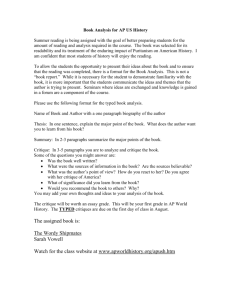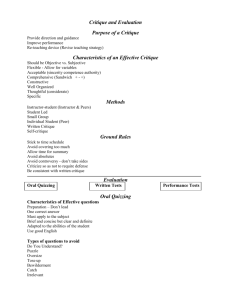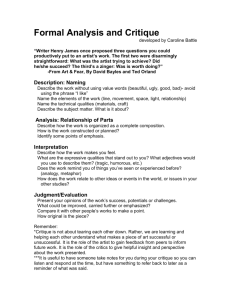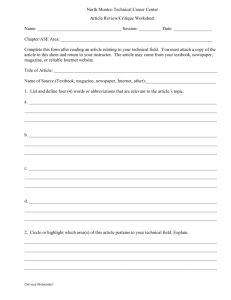Syllabus - My MBC Home
advertisement
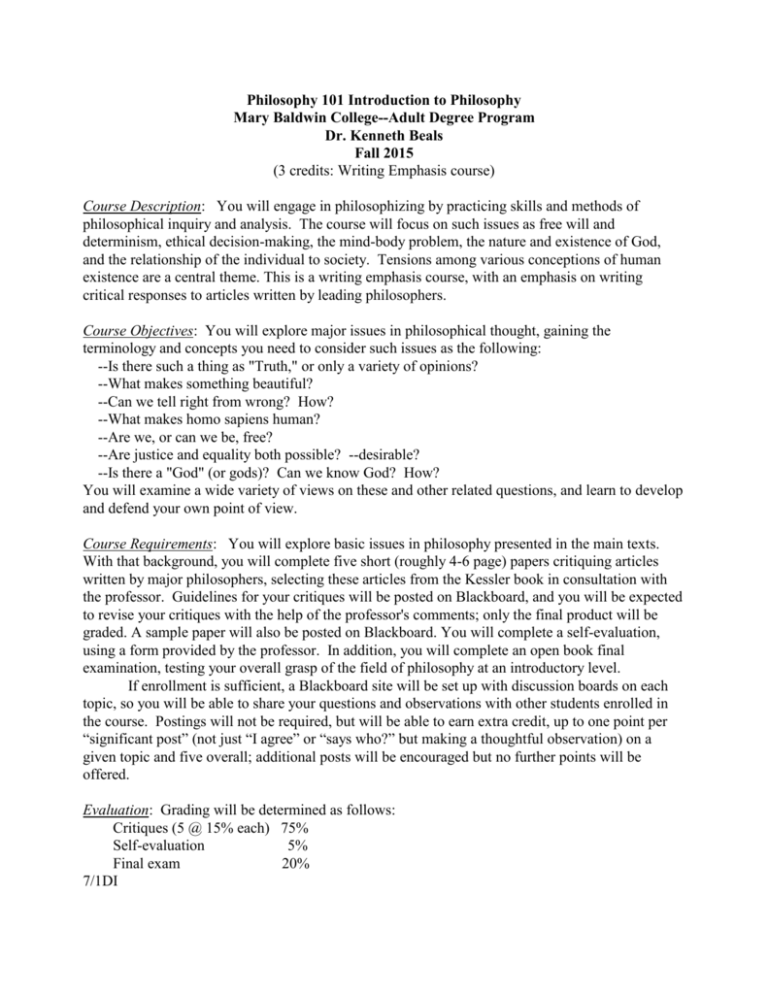
Philosophy 101 Introduction to Philosophy Mary Baldwin College--Adult Degree Program Dr. Kenneth Beals Fall 2015 (3 credits: Writing Emphasis course) Course Description: You will engage in philosophizing by practicing skills and methods of philosophical inquiry and analysis. The course will focus on such issues as free will and determinism, ethical decision-making, the mind-body problem, the nature and existence of God, and the relationship of the individual to society. Tensions among various conceptions of human existence are a central theme. This is a writing emphasis course, with an emphasis on writing critical responses to articles written by leading philosophers. Course Objectives: You will explore major issues in philosophical thought, gaining the terminology and concepts you need to consider such issues as the following: --Is there such a thing as "Truth," or only a variety of opinions? --What makes something beautiful? --Can we tell right from wrong? How? --What makes homo sapiens human? --Are we, or can we be, free? --Are justice and equality both possible? --desirable? --Is there a "God" (or gods)? Can we know God? How? You will examine a wide variety of views on these and other related questions, and learn to develop and defend your own point of view. Course Requirements: You will explore basic issues in philosophy presented in the main texts. With that background, you will complete five short (roughly 4-6 page) papers critiquing articles written by major philosophers, selecting these articles from the Kessler book in consultation with the professor. Guidelines for your critiques will be posted on Blackboard, and you will be expected to revise your critiques with the help of the professor's comments; only the final product will be graded. A sample paper will also be posted on Blackboard. You will complete a self-evaluation, using a form provided by the professor. In addition, you will complete an open book final examination, testing your overall grasp of the field of philosophy at an introductory level. If enrollment is sufficient, a Blackboard site will be set up with discussion boards on each topic, so you will be able to share your questions and observations with other students enrolled in the course. Postings will not be required, but will be able to earn extra credit, up to one point per “significant post” (not just “I agree” or “says who?” but making a thoughtful observation) on a given topic and five overall; additional posts will be encouraged but no further points will be offered. Evaluation: Grading will be determined as follows: Critiques (5 @ 15% each) 75% Self-evaluation 5% Final exam 20% 7/1DI Grades will be determined primarily by evidence of mastery of the basic issues presented in the course, with some attention given to clarity of thought and presentation. An A represents outstanding mastery and clear presentation of the subject matter; B, solid mastery and presentation; C, some deficits of mastery and presentation; D, significant deficits, and F represents a failure to accomplish the basic goals of the course. Since most of your grade will be based on essays and essay questions, precise point vales for each grade are not established here. Required Readings: Honer, Stanley M., Hunt, Thomas C., and Okholm, Dennis L. Invitation to Philosophy: Issues and Options. Belmont, CA: Wadsworth, 10th ed. 2006; ISBN 0-534-56460-7 (pa) Kessler, Gary E. Voices of Wisdom: A Multicultural Philosophy Reader. Belmont, CA: Wadsworth, CUSTOM EDITION, ISBN#9781305756366 (loose leaf). CUSTOM PLUS Web resources ISBN#9781337050937 (web resources optional) Recommended Readings: Baggini, Julian. The Pig that Wants to Be Eaten. New York; Penguin/Plume, 2005; ISBN 0-452-28744-8 Tittle, Peg. What If…: Collected Thought Experiments in Philosophy. New York, NY; Pearson, 2005; ISBN 0-321-20278-3 (pa) (Each book offers “thought experiments” on a variety of topics) Contact Information: I may be reached by mail, e-mail or telephone as follows: E-mail: kbeals@mbc.edu Phone: Home, (540) 886-2734; Office, (540) 887-7105 Mail: 613 Alleghany Ave, Staunton, VA 24401 Please note that the office number is for a shared office, so voice mail is not available. Virtual office hours will be set up in consultation with enrolled students. E-mail is the most convenient (and inexpensive!); I generally check e-mail daily (except weekends). Feel free to contact me any time with your questions or concerns! Course Outline Topic Readings Thinking like philosophers Invitation, viii-xxviii, Ch. 1 & 2; Kessler, Part I SELECT FIRST PAPER FOR CRITIQUE (Note that you are not required to write a critique on one of the articles in the introductory section, but may write your first critique on an article selected from Part III) What do you KNOW? Invitation, Ch. 3 & 4; Kessler, Part III SUBMIT FIRST CRITIQUE; SELECT PAPER FOR SECOND CRITIQUE The Big Picture; The search for Ultimates Invitation, Ch. 5 & 7; Kessler, Part IV, Ch. 8 & 12 SUBMIT SECOND CRITIQUE; SELECT PAPER FOR THIRD CRITIQUE Is beauty in the eye? Invitation, Ch. 9; packet (if requested) SUBMIT THIRD CRITIQUE; SELECT PAPER FOR FOURTH CRITIQUE The Human Condition Invitation, Ch. 6 & 10; Kessler, Part IV, Ch. 9-11 SUBMIT FOURTH CRITIQUE; SELECT PAPER FOR FIFTH CRITIQUE Ethics & the Good Society Invitation, Ch. 8 & 11; Kessler, Part II SUBMIT FIFTH CRITIQUE; REQUEST FINAL Each critique should be based on readings from different CHAPTERS in Kessler, but you may select more than one from the same PART, e.g. you could write on BOTH metaphysics and philosophy of religion, or both an article from Ch. 3 and one from Ch. 4. However I would ask you to submit articles from at least three different PARTS of the Kessler book to give you a variety of topics. Specific assignments are not listed for the Baggini and Tittle texts; you are encouraged to read through one or both of these books throughout the semester and draw on the thought experiments from time to time as they relate to your critiques. No deadlines are established, but you should pace yourself through the semester, submitting a new critique about every 3 weeks. All papers should be submitted by Dec. 4, and the final exam should be submitted by Dec. 11; graduating seniors may face earlier deadlines for the final exam.

